You become a parenting coach by identifying a specific parenting challenge you’ve successfully navigated, packaging that expertise into a simple offer, and marketing it to parents who need that exact help.
Start by choosing your niche, creating a basic service package, and finding your first paying clients through social media and personal networks.
–
For the 90-day “attract clients” roadmap, jump to this section.
For the PEM sub-niche method to decide which sub-niche to go after, click here.
–
60-Second Self-Check
Before you invest time in this path, let me ask you 5 quick questions.
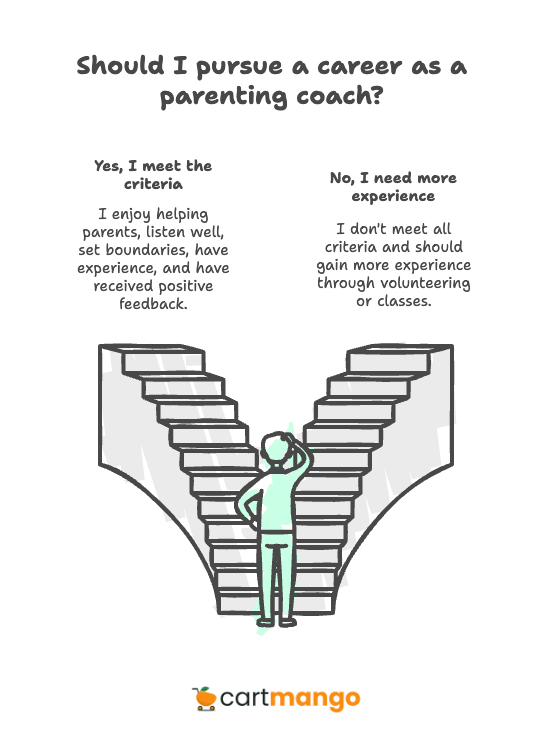
Answer honestly:
- Do you genuinely enjoy helping other parents work through challenges?
- Can you listen without jumping in to fix everything right away?
- Are you comfortable setting boundaries when parents want you to solve problems outside your expertise?
- Do you have at least 3 years of hands-on parenting experience?
- Have friends or family members ever thanked you for parenting advice that actually worked?
If you answered “no” to more than one question, I’d suggest getting more parenting experience first. Perhaps volunteer with family support programs or take a positive discipline class. The coaching world doesn’t need more people who think they can help others just because they read a few books.
PEM Sub-Niche Method
Here’s where most aspiring coaches mess up. They think they can coach “all parents” and end up attracting no one.
You need to pick 1 specific type of parent to help. Use this worksheet to find your sweet spot where passion meets expertise meets paying customers.
P = Passion
E = Expertise
M = Monetizability
Sub-Niches
Sub-Niche | Passion (1-5)* | Expertise (1-5)* | Monetizability (1-5)** |
|---|---|---|---|
Toddlers & Early Childhood | 5 | ||
Teen & Adolescent Parenting | 5 | ||
Special Needs & Neurodiversity | 4 | ||
Solo & Co-Parenting After Separation | 4 | ||
Blended & Adoptive Families | 3 | ||
Parental Well-Being & Mindful Parenting | 3 | ||
Parents of Multiples (Twins, Triplets) | 2 |
*Fill in your own scores (1 = low interest/experience, 5 = high interest/proven success)
**Based on current market research from coaching industry reports
–
How to Use This Worksheet

Rate your passion level for each niche. If the thought of talking about toddler tantrums all day makes you want to hide under a blanket, give it a 1. If you could chat about teen anxiety for hours, that’s a 5.
Rate your existing expertise. This isn’t about formal training. It’s about real results you’ve achieved. Have you successfully navigated the terrible twos with your own kid? Helped a friend through their divorce while co-parenting? That counts.
Add all three numbers. Any total of 11 or higher deserves serious consideration. Anything below 8 means you should probably look elsewhere.
Quick Validation Test
Before you commit to a niche, spend 30 minutes checking demand. Use Google Trends to see if searches are rising or falling. Look for Facebook groups with at least 5,000 active members asking questions about your niche. Find three competitors charging real money for similar services.
If you can’t find evidence of paying demand, circle back to another niche combination. Don’t force a market that doesn’t exist.
Starter Package & Pricing
Now that you’ve picked your niche, let’s turn your knowledge into something people will buy. I’m about to share a pricing structure that most new coaches get completely wrong.
Service Tiers
Package Type | What’s Included | Price Range | Best For |
|---|---|---|---|
Starter Pack | 3 one-hour calls + text support between sessions + simple worksheet | $270-$315 | First-time clients, building testimonials |
Growth Package | 6 calls over 3 months + unlimited text + custom action plan | $675-$750 | Committed parents ready for deeper work |
Group Coaching | 4 group calls + private community + worksheets | $225-$265 per person | Parents who prefer peer support |
1.5x Your Hourly Rate
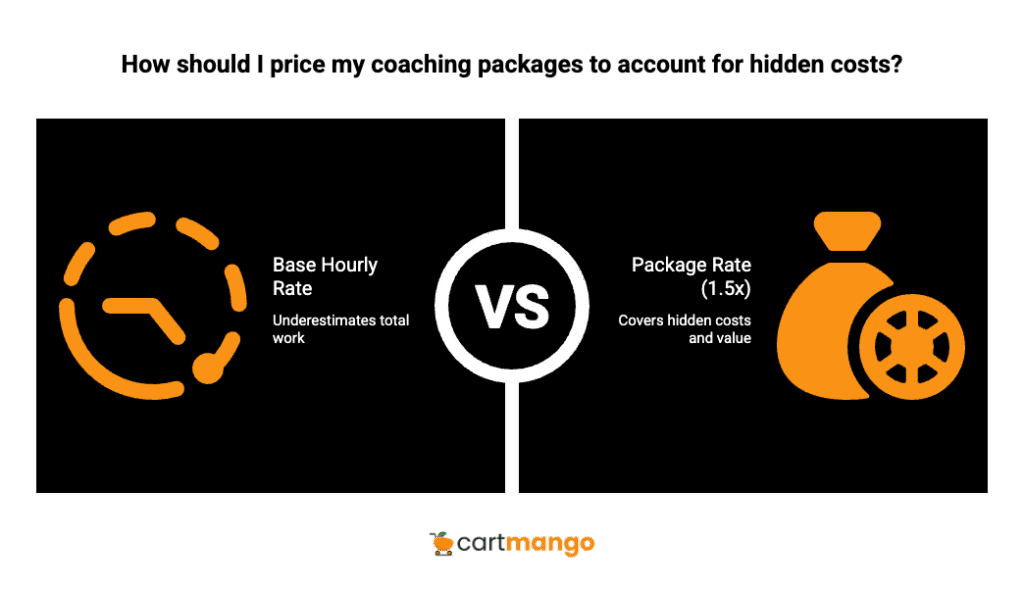
If you’re thinking of charging your base hourly rate for a package, stop right there. That’s a rookie mistake that will leave you working for peanuts.
A package requires prep time before each call and follow-up after. You’ll spend 20-30 minutes reviewing notes and creating custom suggestions. The client gets text support between sessions. Payment processing fees eat into your revenue.
When you factor in these hidden costs, pricing at 1.5 times your hourly rate barely covers the extra work. If your base rate is $60 per hour, charge $270 for three sessions. This protects your time while still feeling approachable to nervous first-time buyers.
No-Frill Marketing Plan
Marketing as a new parenting coach can feel like shouting into the void. I’ve watched too many talented coaches burn out because they tried every strategy at once and saw zero results.
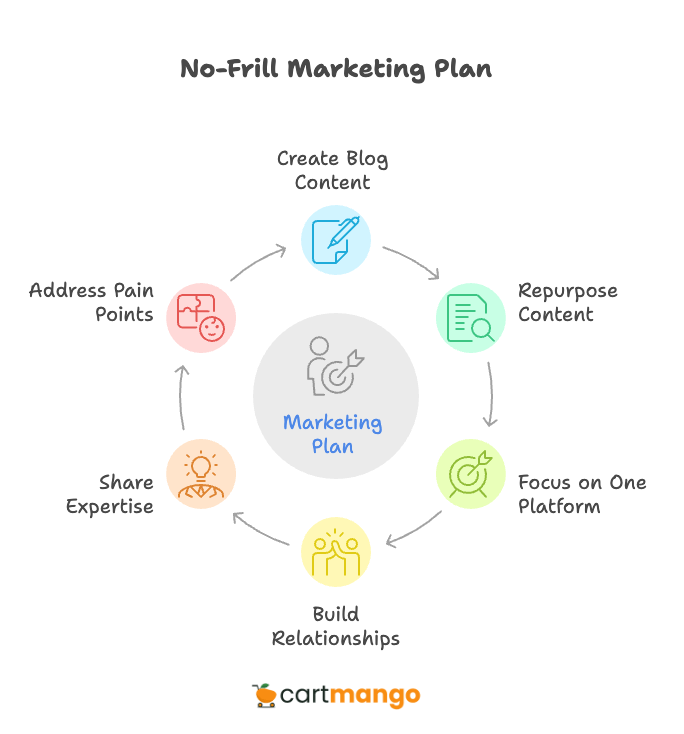
Content Foundation
- Write detailed blog posts answering your niche’s biggest questions
- Turn 1 post into 5 different social media posts
- Choose ONE platform to focus on (Instagram, Facebook, YouTube, X)
- Post consistently for at least 3 months before adding other platforms
Relationship Building
- Join 3 Facebook groups where your ideal clients hang out
- Answer questions genuinely without pitching your services
- Share one helpful tip per week that showcases your expertise
Strategic Content That Work
Your social media posts should address specific pain points.
Instead of “Tips for better parenting,” try “What to do when your 4-year-old refuses to get dressed for school.” Instead of generic advice, share the exact script you used with your own child.
Here are 3 post formats that consistently get engagement:
- The “before/after” story showing a parenting struggle and resolution
- The “myth vs reality” post that corrects common misconceptions
- The “quick win” post with one actionable tip parents can try today
For collaboration with podcast hosts, offer to share 3 lesser-known parenting strategies for their specific audience. Many hosts struggle to find fresh content, so your niche expertise becomes valuable to them.
The Testimonial Snowball Method
Start by asking your satisfied clients to share their experience in their own Facebook groups. One genuine post from a happy parent reaches hundreds of people who trust that source.
When someone comments asking for details, have your client tag you in the response. This warm introduction converts 10 times better than cold outreach. I’ve seen coaches book 3-4 new clients from a single testimonial share.
The key is timing. Ask for the share right after you’ve helped solve a specific problem. Parents are most motivated to help when they’re feeling grateful and seeing real results.
Simple DM Script for Warm Contacts
“Hi [Name], I just launched a service helping parents with [specific problem]. I remember you mentioning challenges with [related issue]. Would a quick 15-minute chat be helpful? No pressure if it’s not a fit.”
- Keep it short
- Reference a specific conversation you remember
- Offer value before asking for anything.
This approach feels natural instead of salesy.
Local Partnerships
Reach out to preschool directors, family yoga instructors, and children’s librarians. These professionals see struggling parents daily but can’t offer coaching themselves. A simple referral arrangement benefits everyone.
Send them a one-page flyer explaining your service and offer to present a free 30-minute workshop for their parent community. This builds trust and showcases your expertise without the pressure of a sales pitch.
90-Day “Attract Clients” Roadmap
Weeks 1-4: Foundation Building
- Week 1: Complete niche worksheet and pick your focus area
- Week 2: Write your one-page service description and pricing
- Week 3: Use Google Meet (free plan supports up to 60 mins) and Calendly for scheduling
- Week 4: Create simple one-page website using Google Sites or Carrd
Week 1 matters because clarity drives everything else. Without a specific niche, your marketing becomes generic and ineffective. Spend time here.
Week 2 forces you to articulate your value clearly. If you can’t explain what you do in one page, potential clients won’t understand either. This exercise reveals gaps in your thinking.
Week 3 removes friction from the booking process. Clients who have to email back and forth to schedule often lose momentum and hire someone else. Make it easy for them to say yes.
Week 4 gives you credibility. A simple website with your photo, bio, and testimonials makes you feel legitimate to both clients and yourself.
Weeks 5-8: Beta Client Recruitment
- Week 5: Reach out to 10 people in your personal network about your new service
- Week 6: Offer free 30-minute strategy sessions to gather feedback
- Week 7: Convert 3 feedback sessions into beta coaching clients
- Week 8: Begin first round of beta coaching sessions
Week 5 tests your messaging with people who know and trust you. Their questions reveal what you need to clarify before approaching strangers.
Week 6 builds your confidence while gathering real market feedback. These conversations tell you whether your niche choice resonates with actual parents.
Week 7 is where you learn to close. Converting interested prospects into paying clients requires practice. Beta pricing removes the money pressure while you develop this skill.
Week 8 starts your coaching experience. Every session teaches you something new about what parents really need versus what you think they need.
Weeks 9-12: Testimonial Collection & Refinement
- Week 9: Complete beta sessions and request detailed feedback
- Week 10: Revise your service based on what you learned
- Week 11: Ask beta clients for written testimonials and referrals
- Week 12: Launch your refined paid service to the public (use CartMango for “taking orders” and getting money from your clients)
The timeline might feel aggressive, but it can work. Taking longer usually means getting stuck in perfectionism instead of helping real families. You’ll learn more from three imperfect coaching sessions than six months of planning.
Don’t skip the beta phase just because you’re eager to start earning. Those first few clients teach you things no course or book can cover. What questions do parents actually ask? Which techniques work in real conversations versus theory? How long do sessions really need to be?
Boundaries & Red-Flags
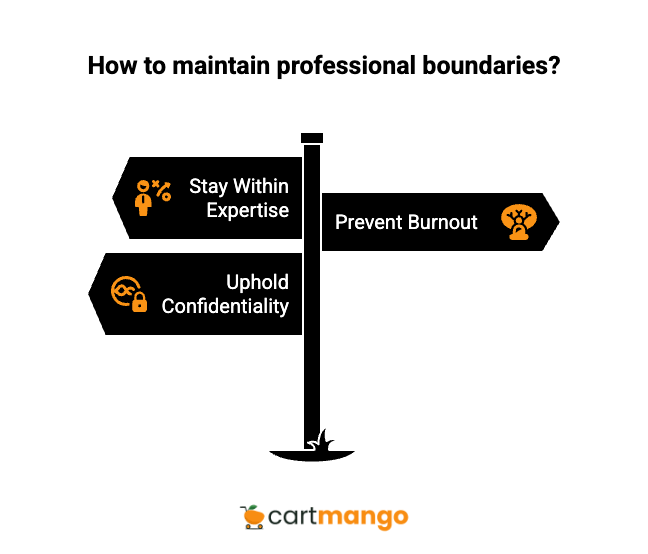
Coaches help parents develop skills and strategies. Therapists treat mental health conditions. Crossing that line puts everyone at risk.
Maintaining clear boundaries protects both you and your clients in ways that might not be obvious at first. When you stay within your expertise, clients get better results because you’re confident in your advice. When you venture outside your knowledge, you become tentative and less helpful.
Boundaries also prevent burnout. Parents in crisis often want their coach to be available 24/7. Without limits, you’ll find yourself checking texts at midnight and feeling responsible for outcomes beyond your control.
Your confidentiality clause should state that you’ll break confidentiality if you hear about child abuse or safety threats. Every state has different mandated reporter requirements, so check your local laws.
Three situations require immediate referral to licensed professionals: mentions of self-harm or suicide, suspected abuse or neglect, and substance abuse affecting parenting. Keep a list of local family therapists and crisis hotlines handy.
The hardest part of maintaining boundaries is when parents push back. They might say you’re the only person who understands their situation or that they can’t afford therapy. Stay firm while remaining compassionate. Your job is to coach within your competence, not to be their everything.
When to Formalize
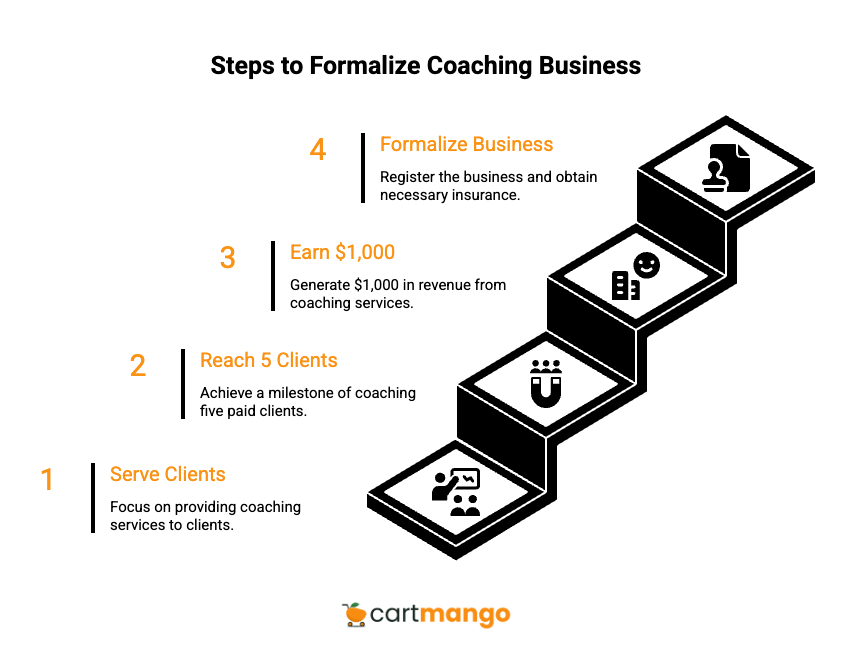
I see new coaches spending hundreds on business registration and insurance before they’ve coached a single paying client. That’s backwards thinking that kills momentum.
Wait until you have 5 paid clients or $1,000 in revenue before filing your LLC. The SBA has a guide to set up your business.
Focus your energy on serving clients first. Handle paperwork (and pay for unnecessary expenses) second.
Growing Your Parent Coaching Business
Once your parent coaching business starts gaining momentum, you’ll face decisions about professional development and scaling. Many parenting coaches wonder whether formal parent coach certification will make all the difference in their success.
The truth is that while a bachelor’s degree isn’t required to become a parent coach, getting more awareness about child development and practical strategies can give you a competitive edge.
When Certification Makes Sense
A successful parenting coach knows when to invest in parenting coach certifications. If you’re ready to gain hands on experience through structured coaching programs, here’s what to consider:
- Target audience expansion: Certification helps you guide parents through complex issues you might not tackle otherwise
- Credibility with other professionals: A certified parent coach often gets referrals from pediatricians and therapists
- Higher rates: Clients pay more for certified parent coach services
The Jai Institute for Parenting offers comprehensive parenting coach certification programs. Their certification program focuses on practical experience rather than just theory. You’ll practice coaching real scenarios and get instant access to resources that help you support parents more.
Building Coaching Skills That Matter
The best parent coaches focus on skill building that creates a positive impact. Your coaching skills should include active listening, conflict resolution, and helping parents make informed decisions. These abilities help parents navigate challenges while building their self esteem and self awareness.
Becoming a certified parenting coach isn’t just about the credentials. It’s about developing the coaching experience to help parents become a better parent through practical strategies. When you can guide parents through personal transformation while building healthy relationships with their children, that’s deeply rewarding work.
Scaling Your Coaching Services
Your parenting coaching business can grow beyond one-on-one sessions. Many parenting coaches expand their coaching services by offering group programs, writing a guest post for parenting blogs, or partnering with other professionals.
The key difference between a life coach and parent coaches is specialization. When you become a parent coach, you develop expertise in child development and family dynamics. This focused approach helps you convert leads more effectively because parents know you understand their specific challenges.
Future clients want coaches who can provide practical experience, not just theory. Your hands on experience as a parent, combined with formal parent coaching training, positions you as an amazing coach who can support parents through real-world situations.
FAQ
Do I need professional certifications to coach parents?
No, professional coaching certifications are not required. Parents care more about whether you’ve successfully navigated similar challenges than formal credentials. You can always add certifications later as your business grows.
Do I need a psychology degree to become a parenting coach?
No formal degree is required. Again, your lived experience and proven results matter more than credentials.
How long before I can quit my day job?
Most coaches need at least 12 months to replace part-time income. Full-time replacement typically takes 24+ months with consistent effort. Start as a side business and scale gradually rather than making dramatic leaps.
What if a client asks for a refund?
Build a simple refund policy into your contracts. Offer full refunds within 48 hours, partial refunds after the first session. Most refund requests come from mismatched expectations, which you can prevent with clear communication upfront.
Can I coach parents internationally?
Yes, but research tax implications and time zone challenges. Many coaches find success with expat communities who prefer English-speaking support. Consider the cultural differences in parenting approaches when working across borders.
How do I coach parents of special needs children?
Only coach in areas where you have direct experience. This niche requires specialized knowledge that comes from living the challenges, not reading about them. Partner with occupational therapists and special education advocates for referrals both ways.
What happens if I don’t get results for a client?
Not every coaching relationship works perfectly. Sometimes the timing isn’t right, or the parent isn’t ready to implement changes. Document your process and be honest about what’s not working. Most parents appreciate transparency over false optimism.
Your Turn
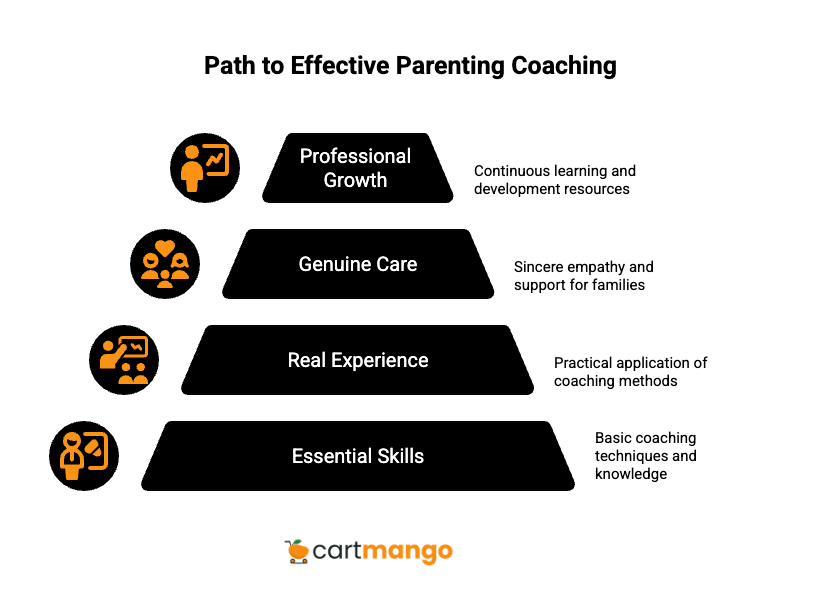
You now have everything you need to start coaching parents within 90 days. The Center for Parenting Education offers additional resources for ongoing professional development as you grow your practice.
Stop overthinking and start helping families. The parenting world needs coaches who combine real experience with genuine care for others.
Disclaimer: This content is for educational purposes only and does not constitute professional, legal, or business advice.
Related
- SamCart vs Sellfy: the customer cash hostage (2026)
- Payhip vs ThriveCart: losing what you built (2026)
- ThriveCart vs Gumroad: the recurring revenue trap (2026)
- Where to Buy Digital Products to Resell: 6 Top Places in 2026 (+ a glaring problem)
- SamCart vs Gumroad: who actually owns your customers? (2026)
- Is Gumroad Safe in 2026? Uncovering the Hidden Pros and Cons
- Payhip vs Podia: The Recurring Income Hostage (2026)
- Payhip vs SamCart: The Recurring Revenue Handcuffs (2026)
- SamCart vs ClickFunnels: The Recurring Revenue Hostage (2026)
- SendOwl vs ThriveCart: Which has a hidden trap in 2026?
